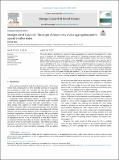Straight out of Cape Cod: The origin of community choice aggregation and its spread to other states
Author(s)
Hsu, David
Download1-s2.0-S2214629621004783-main.pdf (492.9Kb)
Publisher with Creative Commons License
Publisher with Creative Commons License
Creative Commons Attribution
Terms of use
Metadata
Show full item recordAbstract
This policy history describes how community choice aggregation was created in Massachusetts by a small
group of advocates and subsequently spread across the US. Twenty-one interviews with key participants,
primary materials from government and personal archives, and newspaper articles were used to attribute
and corroborate these events. A new finding is that community choice aggregation was created as part of
electric sector restructuring efforts in Massachusetts in 1997, but that this new policy was barely perceived by
many stakeholders in the larger restructuring process, and was included by legislators in response to advocates
who organized local governments through direct democracy strategies. Kingdon’s multiple streams approach
provides a useful framework to understand how organizing by advocates led to successful passage of legislation
in Massachusetts. The spread of community choice aggregation to other states occurred through organizing
that combined advocacy with policy learning and emulation. CCA has since been adopted by more than 1800
local governments that represent more than 36 million people in six states. This article concludes by discussing
the early outcomes, current status, and some prospective implications of community choice aggregation.
Date issued
2022-04Department
Massachusetts Institute of Technology. Department of Urban Studies and PlanningJournal
Energy Research & Social Science
Publisher
Elsevier BV
Citation
Hsu, David. 2022. "Straight out of Cape Cod: The origin of community choice aggregation and its spread to other states." Energy Research & Social Science, 86.
Version: Final published version
ISSN
2214-6296